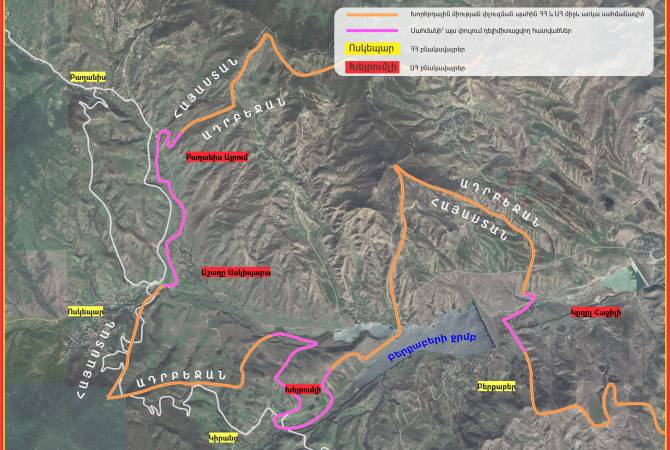
Armenia and Azerbaijan have reached a landmark agreement on border delimitation, prompting condemnation and protests from people living in border villages in Armenia.
On Friday, Yerevan announced that Armenia and Azerbaijan had ‘preliminary agreed’ on the delimitation of various sections of the two countries’ shared border, adding that the delimitation would be based on the Alma-Ata Declaration.
In the 1991 declaration, the two countries recognised each others’ borders as they stood at the time of independence from the Soviet Union.
In March, Baku demanded that four abandoned villages be ‘immediately released’. Days later, Prime Minister Nikol Pashinyan hinted that Armenia might return control of the four villages to Azerbaijan in a unilateral handover of territory to avoid war.
Following the dissolution of the Soviet Union and the outbreak of the First Nagorno-Karabakh War in the early 1990s, several areas along the border of both Armenia and Azerbaijan fell under the control of the opposing side. This included the Azerbaijani villages of Baghanis Ayrym, Ashagi Eskipara, Kheyrimli, and Gizilhajili, which remain occupied by Armenia.
On Friday, Pashinyan’s office released a map highlighting the areas of delimitation that had been agreed. The accompanying comment, given to ArmenPress, suggested that Azerbaijan would receive ‘two and a half villages belonging to it’, in exchange for which Armenia would receive ‘a reduction in risks related to security and border delimitation’.
At present, the comment notes, areas that had the potential to cause transport issues were not being delimited. A major road that connects Armenia to Georgia runs through Azerbaijani territory under Armenian control in the northern area of the border.
The statement also noted that one and a half villages were already under Azerbaijani control, meaning that they were not being considered in the area that was being handed over.

The Prime Minister’s office declared the agreement ‘an unprecedented event’.
Officials from Germany, Norway, and Turkey, as well as President of the European Council Charles Michel, UN Secretary-General António Guterres’s spokesperson, and NATO’s Special Representative for the Caucasus and Central Asia Javier Colomina welcomed the agreement.
However, people living in villages in Tavush Province, near the border, blocked roads in protest against the agreement, citing security concerns.
The Armenian Prime Minister’s office noted that Azerbaijan’s border guards would move closer to the villages of Kirants and Voskepar in Tavush Province, but that they would remain separated by ‘a delimited state border’. It added that many details relating to providing security would soon be discussed.
People living in the region on Saturday blocked the road connecting Armenia to Georgia, demanding a meeting with Armenia’s chair of the Border Delimitation Commission, Mher Grigoryan. While the roads were unblocked the same day, after the request was granted, they were closed again the following day after Armenia began demining of the area to be handed over to Azerbaijan.
At the time of publication, the roads remained blocked. Seven protesters were also arrested on charges of hooliganism.
‘Achievement’ or ‘unilateral concession’?
While Prime Minister Nikol Pashinyan on Saturday termed the agreement ‘an achievement’ for both sides, the decision was met with strong opposition in Armenia.
Pashinyan stated that the decision would ‘significantly reduce’ security risks both in that region specifically, and ‘in general along the entire border of Armenia’, and suggested that Russian troops in some parts of Tavush would leave as a result of the process.
‘We have agreed on this part now, but we have also adopted a fundamental principle for the entire process of further border demarcation,’ he noted.
Gohar Vardanyan, a resident of Kirants, told OC Media that she had little confidence in the security promised by Pashinyan.
‘For example, in the Voskepar section, if that section is demarcated, [Azerbaijan] has an enclave above it, which according to the map is theirs. They can provoke something and there will be nothing to protect us,’ said Gohar.
Tigran Grigoryan, a political analyst and the head of the Regional Centre for Democracy and Security in Yerevan, wrote that Armenia had made ‘another unilateral concession without even agreeing with Baku on specific maps’.
‘The reference to the Alma-Ata declaration is there for face-saving purposes. Baku is not interested in delimitation; it has very specific goals and will continue pressing [Armenia] to achieve them’.
Aykhan Hajizada, the spokesperson for Azerbaijan’s foreign ministry, on Friday described the announcement as ‘a long-awaited historical event’.
While Pashinyan’s office mentioned ‘two and a half villages’, Hajizada stated that Armenia had ‘agreed to the return of 4 villages’. Government media repeated the claim that Azerbaijani President Ilham Aliyev had achieved the ‘return’ of four villages, with Azerbaijani TV channels airing interviews with former residents of the villages.









